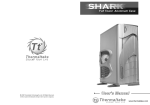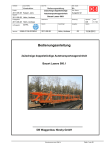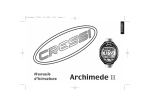Download E-Commerce: Current Issues and Trends in Germany
Transcript
E-Commerce:
Current Issues and Trends
in Germany, the EU and US
Brobeck Hale and Dorr
Munich
July 2, 2002
Overview
•
•
•
•
•
•
•
Cross-Border Jurisdictional Issues
Enforceability of On-Line Agreements
Privacy and Data Protection Issues
Service Provider Liability
Linking, Framing and Related Issues
Cyber-Trespass
Business Method Patents
E-Commerce: Current Issues and
Trends in Germany, the EU and US
July 2, 2002
Page
4
17
42
58
73
82
91
2
Some Recent Figures About
E-Commerce in Germany / EU
• Winter 2001/2002:
– 26,5 Million people in Germany purchased
goods and services for € 2,6 Billion
– 18,5 Million “e-customers“ in the UK, only 5,6
Million in Spain and 3 Mio. in France
– Largest EU markets: Tourism (24,9 Million
customers), books (20,7 Million) and computer
(19,3 Million)
• EITO prognosis: € 440 Billion B2B sales in 2003
E-Commerce: Current Issues and
Trends in Germany, the EU and US
July 2, 2002
3
1.
Cross-Border Jurisdictional Issues
E-Commerce: Current Issues and
Trends in Germany, the EU and US
July 2, 2002
4
Cross-Border Jurisdictional Issues
• These issues are potentially more troublesome for ecommerce than for offline commerce
– Likely to be a far greater number of interstate and
international e-commerce transactions, now that
Internet has created a single world market, at least
for some products
ØResolves many communications problems
ØResolves time-zone differences
– Likely to be a far greater number of interstate and
international transactions involving consumers
– Less likely to be negotiated contracts
ØParties reacting only remotely
ØEmphasis on automated, mass market solutions on the
Internet
E-Commerce: Current Issues and
Trends in Germany, the EU and US
July 2, 2002
5
Manifestations of Cross-Border
Jurisdictional Issues
• CRIMINAL: If your web site is accessible from a
particular country, you may be subject to the criminal
laws of that country
– American neo-Nazi sitting in jail in Germany
– Pakistani arrest warrant for Michael Jackson
• CONSUMER PROTECTION: If problems arise from
your goods and services sold through your web site,
you probably can be sued in the home country of
your customer
• TAX: If you are doing enough business with a
particular country, you might be subject to income
taxes in that country
• These are new issues, not yet squarely addressed by
international treaties or conventions
E-Commerce: Current Issues and
Trends in Germany, the EU and US
July 2, 2002
6
Status of U.S. Law on
Internet Jurisdictional
• Each U.S. state and federal district may have
different rules
• Some initial decisions have found that a website
alone justifies jurisdiction, although most decisions
have required more
– TESTS: Web site plus interactive component?
Clear effort to do business in jurisdiction? Physical
presence?
– Problem: Tension between commercial objectives
and limiting jurisdictional exposure
• American Bar Association is trying to propose
standardized guidelines
E-Commerce: Current Issues and
Trends in Germany, the EU and US
July 2, 2002
7
Toys R Us v. Step Two, SA
• US company sought to sue Spanish company in US
court because web site infringed on US trademark
• Spanish company had been careful in limiting use of
web site to Spain
– Only took orders for shipment to Spanish
addresses
– Prices in pesetas and Euros only
– Spanish language site
– Contact information only by phone, without
international access code
• U.S. federal district court in New Jersey found no
jurisdiction
– Interactive site alone not enough
– No proof that Step Two was reaching out to New
Jersey
E-Commerce: Current Issues and
Trends in Germany, the EU and US
July 2, 2002
8
Effort to do business, or intent to cause
harm?
• Pavlovich: out-of-state web site operator marketed
programs designed to defeat copy protection system
used to protect DVDs
– California court exercised jurisdiction because
defendant used site to intentionally injure
California businesses
– Did not need to show that defendant tried to do
business in California
E-Commerce: Current Issues and
Trends in Germany, the EU and US
July 2, 2002
9
Cross-Border Issues in Germany/EU:
Defendant Located in the EU
• Where can we sue the defendant?
• New EUGVVO applicable since
March 01, 2002
• In general:
- Individuals must be sued in the courts where they
have their legal residence (Art. 2 para 1)
- Legal entities must be sued where they have their
legal seat (Art. 60)
E-Commerce: Current Issues and
Trends in Germany, the EU and US
July 2, 2002
10
Cross-Border Jurisdiction Issues:
Defendant Located in the EU (cont.)
But:
• Venue of the branch (Art. 5 No.5)
• In contract disputes: venue of the place of fulfilment
(Art. 5 No.1 – for sales of tangible goods place of
delivery)
• Consumer venue (Art. 15, 16 ): in most cases at the
legal residence of the consumer
E-Commerce: Current Issues and
Trends in Germany, the EU and US
July 2, 2002
11
Defendant Located Outside of the EU
• German international law of civil procedure is
applicable; provisions of the ZPO are applied mutas
mutandis
In general:
• Individuals must be sued at the courts where they
have their legal residence (Sec. 12, 13, 16 ZPO)
• Legal entities must be sued where they have their
legal seat (Sec. 17 ZPO)
E-Commerce: Current Issues and
Trends in Germany, the EU and US
July 2, 2002
12
Defendant Located Outside of the EU
(cont.)
In particular:
• Venue of the branch, if the claim is related thereto
• Venue where assets are located, Sec. 23 ZPO, if
assets in Germany and a sufficient relation, i.e. in online cases:
• Is the business of the ISP directed to Germany?
• Is there a significant number of German customers?
E-Commerce: Current Issues and
Trends in Germany, the EU and US
July 2, 2002
13
Defendant Located Outside of the EU
(cont.)
• In contract disputes: venue of the place of fulfilment,
i.e.
- Duties fulfilled off-line: seat of the ISP regarding
Delivery /residence of customer regarding
Payment
- Duties fulfilled on-line (e.g. download of software):
Legal seat of the ISP
E-Commerce: Current Issues and
Trends in Germany, the EU and US
July 2, 2002
14
Applicable Laws:
ISP Located within the EU –
Country-of-Origin Principle
• Introduced by the EU e-commerce Directive
2000/31/EG and the new German law on ecommerce (EGG)
• Since January 01, 2002, on-line practices of any ISP
with its legal seat within an EU member state will be
governed by the laws of that member state
• But: National consumer protection laws remain
applicable
E-Commerce: Current Issues and
Trends in Germany, the EU and US
July 2, 2002
15
Applicable Laws:
ISP Located outside the EU
• International private law rules apply
• German consumer protection laws remain applicable
E-Commerce: Current Issues and
Trends in Germany, the EU and US
July 2, 2002
16
2.
Enforceability of On-Line Agreements
E-Commerce: Current Issues and
Trends in Germany, the EU and US
July 2, 2002
17
Why use On-Line Agreements?
• Given the volume of transactions on-line, it is
impractical to have separately negotiated agreements
• Given the nature of the Internet, both buyers and
sellers want the convenience of “agreeing to terms”
on-line
– Can apply to any goods and services ordered online, even if delivered through conventional means
• Using on-line agreements discourages even large
buyers from insisting on separately negotiated terms
E-Commerce: Current Issues and
Trends in Germany, the EU and US
July 2, 2002
18
ProCD Incorporated v. Zeidenberg
• Shrink-wrap agreements are enforceable, provided
that:
– Their terms are “commercially reasonable” and not
otherwise unconscionable or subject to any other
defense available under contract law
– User has right to reject terms upon opening
package and to receive a full refund
• Rejected argument that all of the terms and
conditions of a shrink-wrap agreement must be
printed on the outside of the product packaging.
• Later extended to on-line agreements (called “clickthrough” or “click-and-accept agreements”) and terms
of use of web sites (called “browse-wrap
agreements”)
E-Commerce: Current Issues and
Trends in Germany, the EU and US
July 2, 2002
19
Specht v. Netscape Communications
• Court found that users were not bound by Netscape’s
arbitration clause in its browse-wrap agreement, for
those users never assented to terms
• Free download
– Terms only visible by scrolling down screen, below
download button, to message, and then clicking
on link from message
– Message “Please review and agree to the terms of
Netscape . . . License before downloading and
using the software”
E-Commerce: Current Issues and
Trends in Germany, the EU and US
July 2, 2002
20
Specht v. Netscape Communications
• Court concluded that mere downloading did not equal
assent
• Court also rejected the idea that user could be bound
to a contract without even seeing the message
referring to that contract
• In addition to the way the message was shown, court
found that language used was merely an invitation to
agree, rather than a requirement for use of the
software
E-Commerce: Current Issues and
Trends in Germany, the EU and US
July 2, 2002
21
Strategy for Enforceability:
Step #1 - Before Submitting Order
• Immediately above key where customers submit
orders, cause customer to accept terms and
conditions
• Two alternative methods
• Method #1: Use of this product is subject to your
acceptance of Licensor’s terms and conditions of
sale.
E-Commerce: Current Issues and
Trends in Germany, the EU and US
July 2, 2002
22
Strategy for Enforceability:
Step #1 - Before Submitting Order
• Method #2: Terms and Conditions visible through
scroll field.
• Below scroll field:
– By submitting this order, I accept the terms and
conditions set forth above.
– “Submit Order” or “I accept” button
E-Commerce: Current Issues and
Trends in Germany, the EU and US
July 2, 2002
23
E-Commerce: Current Issues and
Trends in Germany, the EU and US
July 2, 2002
24
Strategy for Enforceability:
Step #2 - Accessibility of Terms
• Make terms easily accessible, both before and after
acceptance
• Available on web site or by fax
• Set out in full within delivered product
– Behind “About Product” box, under “Help” menu
– Printed version in brochure within package or in
user manual (if there is one)
E-Commerce: Current Issues and
Trends in Germany, the EU and US
July 2, 2002
25
Strategy for Enforceability:
Step #3 - Installation
• As part of the installation program for any
downloaded product, show those terms and
conditions again (after all, installer may not be
downloader).
– The user must be able to scroll down through the
agreement if he so chooses. The user must hit an
"Accept Terms" key TWICE before he can
complete installation and then use the product.
– If he hits the "Reject Terms" key, the installation
program aborts and the user will not be able to
use the product.
E-Commerce: Current Issues and
Trends in Germany, the EU and US
July 2, 2002
26
Strategy for Enforceability:
Step #4 - Splash Screen and Help Menu
• Once installed, the user would not be asked again to
accept the terms.
• However, every time the user enters the product, the
splash screen for the product will display, in addition
to the typical copyright and trademark notices, the
statement (after all, user may not be installer or
downloader):
– Use of this product is subject to the terms and
conditions found under this product’s Help Menu.
E-Commerce: Current Issues and
Trends in Germany, the EU and US
July 2, 2002
27
Strategy for Enforceability:
Step #5 - Battle of Forms
• If seller receives a purchase order from a prospective
buyer, then it must either:
– Send that prospective buyer a copy of the terms
and state very clearly that:
ØSeller’s acceptance of the purchase order is expressly
conditioned upon those terms; and
ØSeller shall not ship the product until the prospective
buyer communicates its acceptance of those terms; or
E-Commerce: Current Issues and
Trends in Germany, the EU and US
July 2, 2002
28
Strategy for Enforceability:
Step #5 - Battle of Forms (cont.)
– (although a bit riskier) Ship the product with a
packing slip that clearly and prominently states
that:
ØShipment of the product is pursuant to the buyer’s
purchase order and is subject to Seller’s terms; and
ØIf the buyer does not accept those terms, it should return
the product and Seller will refund any amounts that the
buyer may have already paid for that product.
• The product then shipped to that buyer will also have
to follow Steps #2, #3 and #4 described above.
E-Commerce: Current Issues and
Trends in Germany, the EU and US
July 2, 2002
29
International Enforceability,
based on current statutes and
advice of foreign counsel
• Shrink-wraps: Likely to Be • Unlikely to Be Enforced:
Enforced: U.S., Canada,
Germany, United
France, Italy, Spain,
Kingdom, Australia (?),
Netherlands, Scandinavia,
China -- yet still worth
Brazil, Saudi Arabia, Hong
trying
Kong
• Click-through easier to
• Likely to Be Enforced,
enforce (buyer sees
Subject to Consumer
terms before accepts) -Protection Laws: Mexico,
but still not likely to be
Argentina, Chile
enforced in China
• Less Certain: Japan and
Korea
E-Commerce: Current Issues and
Trends in Germany, the EU and US
July 2, 2002
30
Enforceability of On-Line Agreements
in Germany
• Shrink-wrap
- Although common in some areas (e.g. software),
still considered ineffective under German law
- Option in the B2B area: Choose another law
where shrink wraps are accepted, if one party has
legal residence there (see above)
- Browse-wrap
- Considered ineffective under German law
E-Commerce: Current Issues and
Trends in Germany, the EU and US
July 2, 2002
31
Enforceability Issues:
General Terms in the B2C Area
• When concluding the agreement
- Make an express reference to the terms
- Utilize clear and transparent terms
- Enable the customer to receive notice in a
reasonable way
- Consent of the customer
- Inclusion in an order confirmation or invoice will
not be effective
E-Commerce: Current Issues and
Trends in Germany, the EU and US
July 2, 2002
32
Enforceability Issues:
General Terms in the B2C Area (cont.)
Follow:
• Step#1 Method 2 (see slide 23) plus download (link
or website click box) or
• Step#5 a) or b) (riskier) each plus download (see
slides 28-29)
E-Commerce: Current Issues and
Trends in Germany, the EU and US
July 2, 2002
33
Enforceability Issues:
General Terms in the B2B Area
• B2C rules mainly not applicable, but in order for the
transaction to be legal
- Clear reference to the terms necessary
- Chance for other party to receive notice
- Inclusion by reference in order confirmation is
sufficient
- No objection from other party
E-Commerce: Current Issues and
Trends in Germany, the EU and US
July 2, 2002
34
Enforceability Issues:
General Terms in the B2B Area (cont.)
Follow:
• Step#1 Method 1 or 2 (see slides 22-23) or
• Step#5 a) or b)(riskier), see slides 28-29.
Each method also requires the ability to download the
terms (link/click box on website)
E-Commerce: Current Issues and
Trends in Germany, the EU and US
July 2, 2002
35
Enforceability Issues:
Distance Purchases with Consumers
• Information obligations of the seller (see the new
Sec. 312 c BGB (German Civil Code) and the
corresponding information directive
• Before conclusion of the agreement provide
information about (inter alia): identity of the seller,
address, essential features of the product or service,
limitations upon obligation to make delivery, price
including taxes, shipping cost, right of revocation
E-Commerce: Current Issues and
Trends in Germany, the EU and US
July 2, 2002
36
Enforceability Issues:
Distance Purchases with Consumers
(cont.)
• Without delay, and no later than upon fulfilment of the
agreement, vendor must provide the following
information in written form (email sufficient) to the
customer:
- Sec. 312 c I: see previous slide
- Details of revocation/return right
- Details of seller
- Details of services and warranties
- If applicable, details of termination
E-Commerce: Current Issues and
Trends in Germany, the EU and US
July 2, 2002
37
Enforceability Issues:
Distance Purchases with Consumers
(cont.)
Legal consequences in case of violations:
Agreement remains effective, but
• Time period for revocation right will not start before
receipt of information ; it will end, however, 6 months
after conclusion of the contract
• Potential damage claim of consumer (proof of
damage unlikely)
• Sanctions by consumer protection groups
E-Commerce: Current Issues and
Trends in Germany, the EU and US
July 2, 2002
38
Enforceability Issues:
E-Commerce Obligations, Sec. 312 e BGB
• Inform customer about technical steps to complete
the contract
• Provide the customer with adequate technical means
to recognize and correct improper entries before
submitting order
• Inform customer about whereabouts of copy of
agreement and its accessibility
• Inform customer about language options, if available
E-Commerce: Current Issues and
Trends in Germany, the EU and US
July 2, 2002
39
Enforceability Issues:
E-Commerce Obligations, Sec. 312 e BGB
(cont.)
• Notify the customer, if any vendor policies apply (e.g.
privacy policies), and, if so, provide on-line access
thereto
• Confirm any submitted order immediately by
electronic means
E-Commerce: Current Issues and
Trends in Germany, the EU and US
July 2, 2002
40
Enforceability Issues:
E-Commerce Obligations, Sec. 312 e BGB
(cont.)
Legal consequences in case of violations:
• Agreement remains effective, but:
• Time period for revocation right will not start before
receipt of information; it will end, however, 6 months
after conclusion of the contract
• Potential damage claim of customer
• Sanctions by consumer protection groups
E-Commerce: Current Issues and
Trends in Germany, the EU and US
July 2, 2002
41
3.
Privacy and Data Protection Issues
E-Commerce: Current Issues and
Trends in Germany, the EU and US
July 2, 2002
42
Privacy: U.S. Perspective
• There is no general privacy legislation in the U.S.
• At a philosophical level, balancing the protection of
an individual’s privacy against the commercial value
of information about that individual
• At a practical level, companies need to develop an
adequate privacy policy and then stick to it
• Manifestations:
– No longer enough just to have a policy; Federal
Trade Commission is looking at how that policy
addresses the widely-recognized privacy
principles of:
ØNOTICE about on-line information collection
ØCHOICE regarding uses of that information
E-Commerce: Current Issues and
Trends in Germany, the EU and US
July 2, 2002
43
Privacy: U.S. Perspective
ØACCESS to ensure that information is accurate,
complete, and up-to-date
ØSECURITY and integrity of information collected on-line;
and
ØENFORCEMENT to provide effective recourse for
improper breaches of personal privacy.
– Federal Trade Commission or state consumer
protection agencies may go after a web site
operator:
ØIf it does not follow the privacy policy which it has
adopted; OR
ØIf it violates the privacy policy of another web site from
which it has “data mined”
E-Commerce: Current Issues and
Trends in Germany, the EU and US
July 2, 2002
44
U.S. Sectoral Privacy Mandates
• Internet privacy mandates supplement these
principles on a “sectoral” basis
• Children’s privacy -- Children’s on-line Privacy
Protection Act (COPPA)
• Health data privacy -- Health Insurance Portability
and Accountability Act of 1996 (HIPAA)
• Financial data privacy -- Gramm-Leach-Bliley Act
• Location data privacy -- Wireless Communications
and Public Safety Act of 1999
E-Commerce: Current Issues and
Trends in Germany, the EU and US
July 2, 2002
45
Enforcement
“Self-regulated” DOES NOT MEAN “unregulated”...
FTC can act without new Internet privacy laws:
GeoCities (1998): Registration data released to third
parties contrary to stated restrictions. First Internet
privacy settlement based on FTC charges of “unfair”
and “deceptive” use of on-line data.
ToysMart (2000): Proposed bankruptcy sale of
customer data would violate stated privacy policy
forbidding release to third parties. FTC Settlement
authorized sale only to “qualified purchaser.”
Bankruptcy court rejects settlement.
E-Commerce: Current Issues and
Trends in Germany, the EU and US
July 2, 2002
46
Enforcement (cont.)
ReverseAuction (2000): Collected addresses of eBay
users and sent spam misrepresenting that eBay IDs
were about to expire, in violation of eBay’s terms of use.
“[B]eyond self-regulation, those who violate consumers’
privacy should be promptly called to task.” FTC action
“is an effort to buttress, not supplant or detract from,
initiatives of private parties … who develop and
implement their own privacy arrangements.”
E-Commerce: Current Issues and
Trends in Germany, the EU and US
July 2, 2002
47
On-Line Profiling
• On-line profiling is seen as particularly invasive, even
if the profile is not “personally identifiable”
– Tracks Internet usage of user and develops profile
– Sells “targeted advertising” which matches user’s
profile with specific products and services
• Network Advertising Initiative (NAI), a coalition of
several leading on-line profiling companies,
formulated a set of self-regulatory privacy guidelines
• Those guidelines have been endorsed by the FTC
E-Commerce: Current Issues and
Trends in Germany, the EU and US
July 2, 2002
48
Privacy and Data Protection in Germany
and in the EU
Legal Sources:
• EU Directive 95/46/EG regarding personal data
protection
• German Data Protection Act
(Bundesdatenschutzgesetz – BDSG)
• Teleservices Data Protection Act
(Teledienstedatenschutzgesetz – TDDSG)
E-Commerce: Current Issues and
Trends in Germany, the EU and US
July 2, 2002
49
Privacy: German / EU Perspective
• EU Data Protection Directive became effective on
October 15, 1995; had to be transformed into national
law by October 15, 1998; has been transformed into
German national law by May 18, 2001
• Establishes legal principles for privacy protection and
free flow of data within the EU
• Prohibits the transfer of personal data from EU
countries to any countries which do not have
“adequate” data protection laws
– In other words, the United States, but see “safe
harbor” principles
E-Commerce: Current Issues and
Trends in Germany, the EU and US
July 2, 2002
50
EU Rights of the Data Subject
• Right to be informed of the reasons for data
collection, intended recipients, and data subject's
rights, at the time of collection.
• Right to obtain a copy of data about oneself.
• Right to obtain corrections, erasure or blocking of
data processed in violation of the Directive.
• Appropriate security safeguards must be adopted by
controllers of data.
• Data cannot be kept in identified form for longer than
necessary for those purposes.
E-Commerce: Current Issues and
Trends in Germany, the EU and US
July 2, 2002
51
Privacy and Data Protection in Germany:
Initiate On-Line -Agreements
• Obligation to inform the customer about collection
and use of personal related data at the beginning of
the process
• Active and conscious “informed“ consent of the user
• Provide clear information about data protection law
before any data regarding the data subject can be
entered
• Instruction has to be separate from general terms or
distance purchase law instructions
E-Commerce: Current Issues and
Trends in Germany, the EU and US
July 2, 2002
52
Privacy and Data Protection in Germany:
Tele Services Data Protection Act
• New Tele Services Data Protection Act
(Teledienstedatenschutzgesetz – TDDSG) in force
since January 1, 2002
• Obligations of the ISP
- Data subject must be informed at the beginning of
each process about method, purpose, scope of
collecting, processing and use of personal data
and, whether data is processed outside of EU
E-Commerce: Current Issues and
Trends in Germany, the EU and US
July 2, 2002
53
Privacy and Data Protection in Germany:
Tele Services Data Protection Act (cont.)
• On-line-consent of the data subject is only valid if the
collector ensures that
- The consent is given by an unequivocal and
deliberate act
- The consent is logged
- The content of the consent can be retrieved by the
data subject at any time
E-Commerce: Current Issues and
Trends in Germany, the EU and US
July 2, 2002
54
Privacy and Data Protection in Germany:
Tele Services Data Protection Act (cont.)
• Instruction to the data subject about right to revoke
consent with effect for the future
• Provider has to ensure with adequate means that
- User can disconnect the line at any time
- Personal user data can be immediately deleted or
blocked after the process
- The process for entering data about the user is
secure
E-Commerce: Current Issues and
Trends in Germany, the EU and US
July 2, 2002
55
Privacy and Data Protection in Germany:
Tele Services Data Protection Act (cont.)
- Data about each personal user can be processed
separately
- Personal user data is only used for billing
purposes
- Anonymous user profiles for marketing purposes
etc. are not combined with personal data about
the user
E-Commerce: Current Issues and
Trends in Germany, the EU and US
July 2, 2002
56
Privacy and Data Protection in Germany:
Cookies
• Not generally unlawful
• If they contain personal related data, use is
problematic due to restrictive data protection laws
(Sec. 3 TDDSG)
• Some consider use of cookies as violation of
possession laws (Sec. 862 BGB), some as an
unlawful tort (Sec. 826 BGB)
E-Commerce: Current Issues and
Trends in Germany, the EU and US
July 2, 2002
57
4.
Service Provider Liability
E-Commerce: Current Issues and
Trends in Germany, the EU and US
July 2, 2002
58
US-Communications Decency Act of 1996
• Old rule: carrier may become a publisher by editing
content, and thus could be liable for knowingly or
negligently distributing defamatory material
– Newspaper is liable, while telephone company is
not
• Communications Decency Act: “No provider or user
of an interactive computer service shall be treated as
the publisher or speaker of any information provided
by another information content provider.” (47 USC
230 (c)(1))
E-Commerce: Current Issues and
Trends in Germany, the EU and US
July 2, 2002
59
US-Communications Decency Act of 1996
(cont.)
• Policy rationale:
– Impossible for ISP to screen all postings
– Don’t discourage ISPs from self-policing;
immunize them as a publisher, so that they can
self-police without assuming additional liability;
continue tradition of minimal government
regulation of Internet
E-Commerce: Current Issues and
Trends in Germany, the EU and US
July 2, 2002
60
Extension of Communications Decency
Act into Other Areas
• Stoner v. eBay: CDA shields ISPs from suits for
unfair business practices under a California statute
– Also applied to bar suits based on negligent
dissemination of e-mail, intentional infliction of
emotional distress and posting of allegedly
inaccurate stock price information
• BUT in Gucci America, Inc. v. Hall & Assoc., not a
shield against trademark infringement actions
– CDA states that it may not be “construed to limit or
expand any law pertaining to intellectual property”
E-Commerce: Current Issues and
Trends in Germany, the EU and US
July 2, 2002
61
U.S. -- Digital Millennium
Copyright Act of 1998
• Imposes criminal sanctions for removing security
features
– Russian programmer visiting U.S. was arrested in
2001 for tampering with Adobe eBooks software’s
security features
• “On-line service provider” or OSP defined broadly - a
provider of on-line services or network access, or the
operators of facilities therefor
– Do not need to be in the business of providing online services
E-Commerce: Current Issues and
Trends in Germany, the EU and US
July 2, 2002
62
U.S. -- Digital Millennium
Copyright Act of 1998 (cont.)
• Creates 4 safe harbors for OSPs from copyright
infringement actions (in addition to other defenses
under copyright and other laws):
– Storing material at request of user
– Referring users to material at another location
– System caching, where OSP makes temporary
copy for delivery to subsequent users (applies to
both material placed on line by someone other
than OSP (“Originator”) and material transmitted by
Originator through OSP to user)
– Acting as conduit for material traveling between
other parties
E-Commerce: Current Issues and
Trends in Germany, the EU and US
July 2, 2002
63
Notice and Take-Down Provisions
• OSP must designate, to U.S. Copyright Office and on
its service, contact information
• Notice from copyright owner must be in writing,
signed, include specified info.
– Napster and ALS Scan v. RemarQ Communities
cases have raised questions as to type of notice
required before an OSP can be held liable, and
level of detail required in that notice
• Upon receiving such a notice, OSP must act
expeditiously to remove/block access to allegedly
infringing material
• OSP exempt from liability for copyright infringement
when it in good faith removes or blocks access to
material
E-Commerce: Current Issues and
Trends in Germany, the EU and US
July 2, 2002
64
Notice and Pullback Provisions
• OSP must take additional steps to protect content
provider, which may lead to putting material back in
system
• OSP must take reasonable steps to notify content
provider, who in turn may send “counter notification”
• OSP must provide copy of counter notification to
copyright owner that sent original notice
• Unless copyright owner notifies OSP that it has filed
an action to restrain the alleged infringement, OSP
must replace or unblock the material within 10-14
days of receiving the counter notification
E-Commerce: Current Issues and
Trends in Germany, the EU and US
July 2, 2002
65
ISP Liability: German / EU Perspective
• EU E-Commerce Directive:
- ISPs are not liable for infringing third party content
unless they know or could have known about the
illegal content
- No obligation to monitor
- However, once ISP learns that particular content
is illegal, ISP must block access to such content
E-Commerce: Current Issues and
Trends in Germany, the EU and US
July 2, 2002
66
ISP Liability in Germany –
Tele Services Act
• New Tele Services Act (Teledienstegesetz – TDG) in
force since Jan. 1, 2002
- Teleservices include, inter alia
- Electronical distribution of advertisements for
goods and services
- M-commerce
- Offers to use the internet
- Offers of products or services within interactive
electronic data banks
• Thus ISP´s and entities which offer on-lineagreements are included
E-Commerce: Current Issues and
Trends in Germany, the EU and US
July 2, 2002
67
ISP Liability in Germany –
Tele Services Act (cont.)
• Country-of-Origin principle, Sec. 4 TDG
- German/EU providers are subject to the laws
where they have their legal seat
- Exemptions (inter alia):
- Local consumer protection laws apply
- Local copyright, industrial property and anti trust
law rights apply
- Local data protection laws apply
- No different choice of law
E-Commerce: Current Issues and
Trends in Germany, the EU and US
July 2, 2002
68
ISP Liability in Germany –
TDG Information Duties
• Sec. 6: detailed information about the provider
- Name and address; legal entities have to name
their representatives
- An e-mail contact address which enables quick
contact
- Registration No., e.g. from the Commercial
register, if applicable
- VAT No., if available
E-Commerce: Current Issues and
Trends in Germany, the EU and US
July 2, 2002
69
ISP Information Duties (cont.)
• Any authority or professional regulatory organization
to which the provider is subject, its correct
professional name and professional rules with a link
(if applicable)
• All information should be easily visible and accessible
and present – thus be present on the homepage (as
an imprint)
• Fines of up to € 50000 per violation
E-Commerce: Current Issues and
Trends in Germany, the EU and US
July 2, 2002
70
ISP Liability in Germany –
Liability Privileges, Sec. 8-11 TDG
• Sec. 9: No ISP liability for mere conduit
(Durchleitung), if
- Transfer was not caused
- No selection of addressees
- No selection or choice of information
E-Commerce: Current Issues and
Trends in Germany, the EU and US
July 2, 2002
71
ISP Liability in Germany –
Liability Privileges, Sec. 8-11 TDG (cont.)
• Sec. 11: No ISP liability for storing information of third
parties, if
- No positive knowledge or grossly negligent
ignorance of unlawful information or
- Immediate action to delete or block information
after ISP has knowledge
- Website guest books have to be controlled at least
once a week (Regional Court Trier (4 O 106/00))
E-Commerce: Current Issues and
Trends in Germany, the EU and US
July 2, 2002
72
5.
Linking, Framing and Related Issues
E-Commerce: Current Issues and
Trends in Germany, the EU and US
July 2, 2002
73
Who Owns Linking?
• British Telecom claims that it owns a 1989 patent that
covers hyperlinking, and it is currently suing an ISP to
enforce that patent
• Markman claim interpretation: BT's patented
invention involves the use of a single computer
serving information to multiple terminal devices
– Some analysts believe that hyperlinking is not
covered by the patented invention, as so
interpreted
E-Commerce: Current Issues and
Trends in Germany, the EU and US
July 2, 2002
74
Who Owns Linking? (cont.)
• Prior art: 1945 Atlantic Monthly article; 1968
demonstration
• BT claims that administrative impracticality would
prevent it from suing individual Internet users
– But royalties which ISPs might have to pay to BT
could be passed on to users in the form of higher
fees
E-Commerce: Current Issues and
Trends in Germany, the EU and US
July 2, 2002
75
Clearly Prohibited Linking Practices
• Linking to material which you know to be infringing on
the copyrights of a third party can subject the linker to
liability for copyright infringement (Utah Lighthouse
Ministry case)
• Linking to a web site engaging in criminal activities
can subject the linking party to criminal liability for
aiding and abetting those activities (Japanese
pornography case)
E-Commerce: Current Issues and
Trends in Germany, the EU and US
July 2, 2002
76
Clearly Prohibited Linking Practices
(cont.)
• Framing another site’s content within your own site
“detracts from persona of the linked site” and
constitutes an unfair trade practice
– US: Total News; UK: Shetland Times
– Kelly v. Aribba Soft Corp: Clicking on thumbnail
image and displaying it within search engine’s
screen is framing, and distinguishable from pure
hyperlinking
E-Commerce: Current Issues and
Trends in Germany, the EU and US
July 2, 2002
77
Deep Linking
• Linking to pages “deep” within the linked site,
bypassing home page and advertising
• Deep linking was upheld in Ticketmaster Corp. v.
Tickets.com, Inc. case
– Not copyright infringement (not copying, just
transferring)
– Not violation of terms of use, unless linked site
can show that linking party accepted those terms
– Not unfair competition, as long as there is no
attempt to mislead users about source of linked
information/goods/services
• Similar result in Dutch case (PCM v. Kranten.com)
E-Commerce: Current Issues and
Trends in Germany, the EU and US
July 2, 2002
78
Linking, Framing:
German / EU Perspective
• Linking to a page protected by a trademark is
considered lawful due to an implied consent of the
trademark owner (OLG Düsseldorf MMR 1999, 729;
but see opposite view LG Hamburg CR 2001, 265)
• Deep linking is unfair trade practice (disputed)
• Framing is unfair trade practice
- Framing may be considered to be misleading,
Sec. 3 UWG and unlawful, Sec. 1UWG
- UK: Shetland Times (EIPR 1 (1996), 723)
E-Commerce: Current Issues and
Trends in Germany, the EU and US
July 2, 2002
79
Metatags
• Html code often used to describe the subject matter
of a web site
– Invisible to visitor of web site
– Detected by search engine
• Eli Lilly & Co. v. Natural Answers: use of another
party’s trademark is probative of wrongful intent to
confuse consumers and is significant evidence of
intent to confuse and mislead, a required element of
any trademark infringement claim
• Although some cases go the other way, use of
trademark as a metatag (without using the trademark
in the visible text of a web site) does not necessarily
avoid trademark infringement liability
E-Commerce: Current Issues and
Trends in Germany, the EU and US
July 2, 2002
80
Metatags: German Perspective
• Metatags can create trademark violation (OLG
München CR 2000, 461)
• Massive use of metatags can be unfair trade practice
(Sec. 1 UWG)
• Metatags can violate the name rights, if no relation to
the site (LG Hamburg CR 2002, 374 – Steinhoefel)
E-Commerce: Current Issues and
Trends in Germany, the EU and US
July 2, 2002
81
6.
Cyber-Trespass
E-Commerce: Current Issues and
Trends in Germany, the EU and US
July 2, 2002
82
Spam
• Spam is unsolicited commercial mass E-Mail
messages
• Intel Corp. v. Hamidi: California Superior Court ruled
that spam sent to Intel Corporation's employees
constituted an illegal trespass of Intel's proprietary
computer system
E-Commerce: Current Issues and
Trends in Germany, the EU and US
July 2, 2002
83
Spam (cont.)
• On appeal, Hamidi court found that, even assuming
Intel has not demonstrated sufficient “harm” to trigger
entitlement to nominal damages for past breaches,
Intel showed Hamidi was disrupting its business by
using its property and therefore is entitled to
injunctive relief
– Specifically, the court referred to the disruption of
Intel's business based on the time spent by Intel
employees in reading spammed email messages
and blocking further messages
E-Commerce: Current Issues and
Trends in Germany, the EU and US
July 2, 2002
84
Spam: German / EU Perspective
• EU E-Commerce Directive requires
– unsolicited commercial e-mail (i.e., spam) to be
clearly identified as such
– Providers must regularly consult opt-out registers
• Sending unsolicited commercial e-mail violates
German competition law (unfair trade practice, Sec. 1
UWG)
• After “opt in” of the user commercial e-mails are
considered lawful
• Each commercial e-mail and the sender have to be
recognizable for the recipient (Sec. 7 TDG)
E-Commerce: Current Issues and
Trends in Germany, the EU and US
July 2, 2002
85
Spam: German / EU Perspective (cont.)
• Regional Court Frankfurt/M. (CR 2002, 220 –
web.de):
- Search engine operator is not liable according to
Sec. 1 Unfair Competition Act (UWG) for “indexspamming” i.e. flooding with links to the
spammer´s own homepage. Nor is it reasonable
for the operator to block the information acc. to
Sec. 5 IV TDG.
E-Commerce: Current Issues and
Trends in Germany, the EU and US
July 2, 2002
86
Spidering
• Use of “spiders,” “bots” or other automated means to
derive information from publicly-accessible web sites
• eBay, Inc. v. Bidder’s Edge, Inc.: use of automated
means to collect data from auction site for other
purposes constitutes cybertrespass
– Violation of eBay’s right to exclude others from its
computer systems
E-Commerce: Current Issues and
Trends in Germany, the EU and US
July 2, 2002
87
Spidering – How Much Damage is
Required for Cyber-Trespass?
• Oyster Software v. Forms Processing, Inc.:
– Defendant argued that his bots placed a negligible
load on Oyster's computer system, and therefore
the physical harm done to Oyster was also
negligible
– Court nonetheless agreed with Oyster's assertion
that use of bots to copy Oyster’s metatags was
sufficient for Oyster to prevail on its trespass
claim, and issued injunction.
Ø"While the eBay decision could be read to require an
interference [with property] that was more than negligible,
this Court concludes that eBay, in fact, imposes no such
requirement."
E-Commerce: Current Issues and
Trends in Germany, the EU and US
July 2, 2002
88
Spidering – How Much Damage is
Required for Cyber-Trespass?
• Register.com, Inc. v. Verio
– Use of automated bots to search Register.com’s
WHOIS database
– Although there was no specific physical harm to
Register.com’s web site, court issued injunction,
finding that Register.com’s loss of control over its
web site was “possessory interference,” which
was sufficient harm to constitute trespass
E-Commerce: Current Issues and
Trends in Germany, the EU and US
July 2, 2002
89
Web Crawling
• Monitoring of web sites for various reasons
– Confirming compliance with contractual
commitments (e.g., affiliate networks)
– Checking pricing of competitors
ØUnlike spidering, not collecting data and displaying that
data publicly for other purposes
• Unclear area of law, so take precautions
– Obtain consent of monitored party
– Only monitor sites whose terms of use do not
prohibit such use
ØUnder Ticketmaster case, when are those terms binding?
click-and-accept? simple posting?
– Seek indemnification from company offering web
crawling services
E-Commerce: Current Issues and
Trends in Germany, the EU and US
July 2, 2002
90
7.
Business Method Patents
E-Commerce: Current Issues and
Trends in Germany, the EU and US
July 2, 2002
91
The State Street Bank Patent
• U.S. Patent No. 5,193,056, entitled “Data Processing
System for Hub and Spoke Financial Services
Configuration”
• Claims were for an apparatus, including a computer,
storage, and arithmetic logic circuits for providing
processing for managing a particular financial
services configuration
• The U.S. Court of Appeals for the Federal Circuit in
1998 expressly endorsed business method patents,
describing the courts’ earlier “business method
exception” to patentable subject matter as “illconceived”
E-Commerce: Current Issues and
Trends in Germany, the EU and US
July 2, 2002
92
What is a Business Method Patent?
• Not defined in State Street Bank case
• Often involve Internet-based business models
• Often similar to old business models, but adjusted for
application to the Internet
• Frequently include software or hardware components
E-Commerce: Current Issues and
Trends in Germany, the EU and US
July 2, 2002
93
Famous Examples of
Business Method Patents
• Amazon.com’s U.S. Patent No. 5,960,411: Method
and System for Placing a Purchase Order via a
Communications Network (1-click shopping)
• Priceline’s U.S. Patent No. 5,794,207: Method and
Apparatus for a Cryptographically Assisted
Commercial Network System Designed to Facilitate
Buyer-Driven Conditional Purchase Offers (reverse
auctions)
• Open Market’s U.S. Patent No. 5,715,314: Network
Sales System (payments, shopping carts)
E-Commerce: Current Issues and
Trends in Germany, the EU and US
July 2, 2002
94
How will Business Method Patents be
Interpreted and Treated?
• Narrow interpretations likely
• Lack of enablement or inadequate written description
arguments may be more difficult than in the biotech
context
– The technology is often relatively simple
• But “obviousness” presents a promising defense
– Particularly with broad claims
E-Commerce: Current Issues and
Trends in Germany, the EU and US
July 2, 2002
95
Protection
• Protection of Software
- Sec. 69a et seq German Copyright Act (UrhG)
- Directive 91/250/EC
• Protection of Business Methods
- Unfair competition law
- Contractual
Slight 1
E-Commerce: Current Issues and
Trends in Germany, the EU and US
July 2, 2002
96
Protection
• Patents may
- Lead to a better and more secure position in the
market
- Prohibit others from using the SW/BM
- Be a source of license fees
• Patents are assets to attract investors
Slight 2
E-Commerce: Current Issues and
Trends in Germany, the EU and US
July 2, 2002
97
Examples
• Airline X creates a "Frequent Flyer" program
• E-commerce company develops Software which can
be used to find the best offer on the Internet
• Software company develops a computer device which
contains a SW-based process for language analysis
Slight 3
E-Commerce: Current Issues and
Trends in Germany, the EU and US
July 2, 2002
98
Pro and Contra
• Cons
- Patents lead to a monopoly position and obstruct
competition
• Pro
- Patents encourage competition by providing
incentives for developing technology
•
See also "Open Source" Discussion
Slight 4
E-Commerce: Current Issues and
Trends in Germany, the EU and US
July 2, 2002
99
Legal Background Germany I
•
Sec. 1 of the Patent Act (PatG):
– Para 1: Patents shall be granted for any inventions
which are
ØNew
ØBased on an inventive step
ØCommercially applicable
- Para 2 No. 3: Programs for computers among other
things are not regarded as inventions
- Para 3: However, Para 3 excludes patentability only
to the extent that the inventor as such seeks patent
protection for the computer program
Slight 5
E-Commerce: Current Issues and
Trends in Germany, the EU and US
July 2, 2002
100
Legal Background Germany II
• “Technical nature of an invention“
• Federal Court decisions (old)
- "Antiblockiersystem", 1980 ("core doctrine")
- "Seitenpuffer", "Tauchcomputer", 1992 ("overall
view whether technical or not")
- "Chinesische Schriftzeichen", 1992 ("not technical
but language science")
Slight 6
E-Commerce: Current Issues and
Trends in Germany, the EU and US
July 2, 2002
101
Legal Background Germany III
•
Recent Federal Court decisions
- „Logikverfahren“, 1999 ("extensive technical
(engineering) skills")
- „Sprachanalyse-Einrichtung“, 1999 („installed on a
computer device”)
- „Zeichenketten“, 2000 (“implementation on data
processing media alone is not sufficient”)
Slight 7
E-Commerce: Current Issues and
Trends in Germany, the EU and US
July 2, 2002
102
Legal Background US
• 35 USC § 101:
“Whoever invents…any new and useful process,
machine, manufacture, or composition matter…may
obtain a patent.”
• State Street Decision 1998:
“any subject matter may be patentable which is new
and useful, regardless of any technical contribution.”
Slight 8
E-Commerce: Current Issues and
Trends in Germany, the EU and US
July 2, 2002
103
Legal Background Europe I
• EPO: “An invention is a technical response to a
technical problem”:
- Vicom Decision 1987
- IBM Decisions I and II, 1999
Slight 9
E-Commerce: Current Issues and
Trends in Germany, the EU and US
July 2, 2002
104
Legal Background Europe II
• Draft Directive on Patentability of ComputerImplemented Inventions, 2002
- “Technical contribution”
- “No patents for computer programs only because
they are implemented on a carrier”
- Business Methods are not patentable
Slight 10
E-Commerce: Current Issues and
Trends in Germany, the EU and US
July 2, 2002
105
Legal Background Summary
Germany:
• Technical effect
• If implemented on a computer device
• No patentability of business methods
US:
• New and useful, including business
methods
EU (Future): • Technical contribution
• No patentability of business methods
Slight 11
E-Commerce: Current Issues and
Trends in Germany, the EU and US
July 2, 2002
106
IP Strategy
• Patents may be:
- Expensive
- Disclose trade secrets
- Not efficient (product dependent)
• Alternatives:
- Trademark strategy
- Non-disclosure agreements
- Non-competition clause
- Non-solicitation clause
- Non-disclosure of the source code/escrow
agreements
Slight 12
E-Commerce: Current Issues and
Trends in Germany, the EU and US
July 2, 2002
107
For further information:
• Hale and Dorr Internet Alerts at
http://www.haledorr.com/internet_law/e_alerts.html
• Ken Slade at +1-617-526-6184 or
[email protected]
• Dr. Christian Breuer at +49-89-24-213-107 or
[email protected]
• Dr. Florian von Baum at +49-89-24-213-101 or
[email protected]
E-Commerce: Current Issues and
Trends in Germany, the EU and US
July 2, 2002
108

























































































































